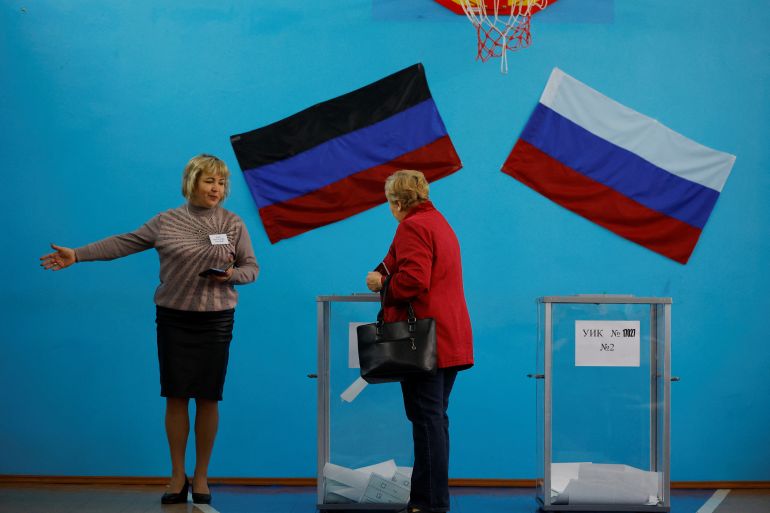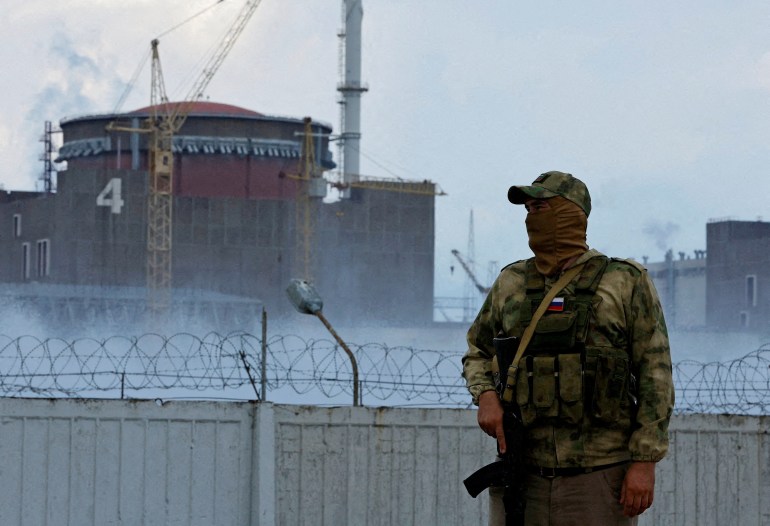Russia’s annexation gamble: Why is Putin raising the stakes?
Russian political insiders say the move to formally seize more Ukrainian territory underscores Moscow’s refusal to back down.

Russia’s attempt to annex southern and eastern Ukrainian territory signals the Kremlin’s commitment to the offensive, according to some Russian political insiders.
“There is no doubt that Russia has crossed the Rubicon,” said Konstantin Zatulin, a senior lawmaker in the State Duma from the ruling United Russia party.
Keep reading
list of 3 itemsRussia poised to annex Ukraine regions after ‘sham’ referendum
EU slams Russia annexation ‘votes’ in four Ukraine regions
Zatulin told Al Jazeera that the recent annexation referendums are meant to show the West that Russia has no intention of backing down from its political and military objectives in Ukraine despite recent setbacks.
“In the face of external pressure, [Russian President Vladimir] Putin usually raises the stakes instead of taking a step back or offering concessions,” he said.
“Such a move closes off some options for retreat, but we’re talking about Russia’s fight to secure its existence and place in the world against efforts to divide and inflict irreparable damage against us.”
Regaining the initiative
Pro-Russian authorities in Donetsk, Luhansk, Kherson and Zaporizhia claimed on Wednesday that residents had voted overwhelmingly in favour of joining Russia, in hastily-organised annexation referendums widely condemned by Kyiv and its Western partners as illegal.
Russia had already recognised Donetsk and Luhansk as independent “people’s republics” back in February, setting the stage for its invasion of Ukraine days later.
Moscow had thrown its support behind the rebel-held statelets in 2014, the year it annexed Crimea from Ukraine – a move that also followed an unrecognised referendum.
Kherson and a large part of Zaporizhia, meanwhile, were captured by Russian forces during the early stages of this year’s conflict.
The referendums took place under military occupation and without any outside oversight, and are viewed by much of the international community as meaningless.
Even Russia’s closest allies – China, India, Kazakhstan, and Serbia – have indicated that they will not recognise the results of the vote or any attempts at annexation.
Nonetheless, Putin will formally announce Russia’s plans to incorporate the four regions during a speech before Russian lawmakers on Friday.
From there, both houses of parliament will be tasked with voting on the resolution at a plenary session next week.

Although there had been discussions about incorporating Donetsk, Luhansk, Kherson, and Zaporizhia into Russia for months, the referendums were announced and held in the space of two weeks.
Andranik Migranyan, a professor at the Moscow State Institute of International Relations and former adviser to the presidential administration, said Russia decided it needed to take “serious and decisive steps to regain the initiative” following a surprise Ukrainian counteroffensive in the northeastern Kharkiv region earlier this month.
The votes and Moscow’s recent decision to mobilise more troops are signs of Russia’s determination, Migranyan argued.
“I think Putin’s decision was meant to dramatically change the situation and put both the West and Ukraine in a very uncomfortable position,” he said.
“These referendums close the door to any negotiations and open the possibility to the total liquidation of Ukraine as an independent state because any territory that Russia gains in the future could be integrated into Russia.”
What comes next?
Migranyan explained that Russia wants to see the West stop arming Ukraine and instead pressure Kyiv to accept Moscow’s terms for ending the conflict.
“Otherwise, Ukraine will cease to exist, which will be a massive defeat for the West – especially for [US President Joe] Biden and the Democrats on the eve of the midterm elections,” he said.
Before the Russian invasion, Moscow had insisted on guarantees that Ukraine would never join NATO. However, since the war began, its terms appear less clear.
Ukrainian President Volodymyr Zelenskyy told CBS News earlier this week that it would become “impossible to continue any diplomatic negotiations” with Russia after it goes ahead with its annexation plan.
For its part, the Kremlin has warned that following the referendums, “the legal situation will radically change from the point of view of international law and that will also have consequences for security in these territories”.
During a national televised address last week, Putin said Russia was prepared to use “all the means at our disposal”, including nuclear weapons, to counter potential threats to its territorial integrity.
Subsequent statements by Foreign Minister Sergey Lavrov and former President Dmitry Medvedev, a close Putin ally, appeared to indicate that this pledge extended to the territories that Russia formally seize from Ukraine.
But two retired Russian generals told Al Jazeera last week that Russia is unlikely to use nuclear weapons in Ukraine unless NATO troops become directly involved in the conflict.
Zatulin likewise dismissed the prospect of Russia conducting a nuclear strike against Ukraine as “nonsense” and contended that previous statements by Moscow had been taken out of context in the West.
“Russia made these statements so that the West understood that it is prepared to use any means if the country’s very existence will be under threat,” he said. “But it is the fate of Ukraine, not Russia, that is at stake right now.”
Zatulin did suggest that Moscow would seek to ramp up its conventional military effort, however.
He predicted that the battle for Ukraine would reach a “crescendo” in November or December, around the time Russia’s forces are expected to begin receiving significant reinforcements from mobilised reservists.
“Some Western analysts have argued that Russia stands to benefit from a prolonged war of attrition,” he said. “I don’t agree with this assessment at all. The quicker Russia can achieve something that can be considered a significant victory, the better.”